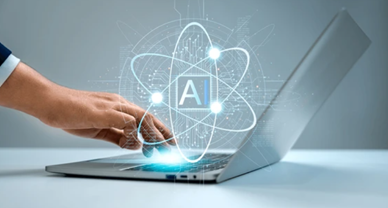Safeguarding the Future at the Crossroads of Artificial Intelligence, Data Privacy, and Intellectual Property Rights
INTRODUCTION
All activities appear to be within our grasp in the ever-evolving world of today and through AI, we have a new champ. AI is altering the way the creation, consumption, and security of digital content and comes up with creative solutions for complicated problems dealing with data analysis and content creation.
AI system training is an extensive process that predominantly entails the receipt of extensive amounts of data. Search phrases; previous purchases, and locations species allow algorithms to becoming more accurate. This does, however, raise substantial issues to do with the protection of Intellectual Property (IP) and data protection. Posing complicated issues on artificial intelligence, data privacy and intellectual property rights, the stakeholders need to come up with some outstanding approaches to ensure a safe environment for all the players involved.
DATA PRIVACY AND INTELLECTUAL PROPERTY RISKS IN THE AI ERA
AI is intrinsically driven by data which is why it is crucial to understand AI in relation to data, as AI is causing ripples and revolutionizing industries. The kinds of data gathered encompass personal preferences up to behavioral patterns, which contributes to AI’s ability to supply customized services. Then, an ethical aspect also appears: Should AI systems be permitted to retain user information without human supervision and consent of people?
This is because, as the AI systems learn from immense amounts of data and produce predictions based on such data, the need for without filtered data poses issues with privacy and Intellectual property rights; moreover, many artificial intelligence systems are ‘black boxed’ meaning it is almost impossible to determine whether or not IP infringement is occurring because it is challenging to identify the data sets that have been used to enhance the model’s outputs.

Further also it stands an equal risk of infringing on one of the critical areas of intellectual property which is trade secrets. Current IP owners are at a risk of losing their exclusivity since the AI models trained on private data may, in a way, broadcast this protected information. Consequently, businesses using AI system, should be careful from such unintentional data disclosures.
Therefore, strong data security protections and associated cybersecurity policies as well as continuous human monitoring of utilization of the accessed data are severely lacking to prevent possible misuse of the private user information by artificial intelligence systems. Thus, tech businesses and governments have the task to ensure openness, responsibility, and high ethical standards employed in sensible regulations and procedures making the user’s privacy and governments the topmost priority.
- REAL-LIFE EXAMPLES
CASE 1: Suggestions That Have Been Generated By The AI Through Eavesdropping As Well As Through Search Behavior.
Privacy concerns can be presented in a circumstance whereby while streaming something on Amazon Prime or any other media service, and then reaching for a Google app on the phone and getting recommendations about the show or even more information about it. This begs the issue: can Google perfectly control all of our applications and everything that we are thinking off or searching for?
Furthermore, simply discussing specific topics can lead to tailored recommended items appearing, which shows that even more eavesdropping of conversations has been done by AI systems.
Symptoms of these privacy risks are as follows, have a direct impact on IPR. Abuse of personal data would jeopardies competitive advantage due to the likelihood of intrusion to secret and secure corporate information. Private data leakages could also expose the location of valuable IPPs making them vulnerable to being eliminated or spied on.
CASE 2: Google’s Location Tracking
Privacy infringements arising from location tracking is among the main issues of Google due to the following possibilities of personal data utilization. Location data is personal and if it is ever hacked or leaked, it can lead to negative consequences such as overseeing people’s movement or promoting the wrong deeds. This impacts IPR in that by revealing power company’s strategic information, information that is often guarded as trade secrets exposes the security of the IP assets, not to mention the resultant compliance issues with data protection laws.
PROTECTION OF INTELLECTUAL PROPERTY RIGHTS AND DATA PRIVACY IN THE AGE OF AI: POSSIBLE SOLUTIONS AND APPROACHES FOR THE FUTURE
Future offers the continuation of improving in various fields the trustworthiness of AI applications, technologies such as powerful machine learning algorithms, natural language processing, and effective predictive analytics. However, if the use of AI solutions intensifies, the number of doubts concerning the scope and intensity of personal data processing permits also increases. It is challenging to predict what new problems new AI technology will bring, so the policy for privacy will always have to be changed and updated. Only mutual cooperation among the governments, business, and civil society will be able to come up with concise guidelines and formulating ethical frameworks for the application of AI technology. Setting up legal conditions for applying artificial intelligence will help to ensure that this magnificent tool will be employed for the sake of society’s benefit and human rights and freedoms recognition. Therefore, the solutions and approaches for the future are as follows:
- AI development must employ anonymizing and pseudonymizing techniques in order to protect personal information hence ensuring that privacy laws are complied with and the risk of violating rights of private data minimized (IPR).
- Develop models on sets of data which have been properly defined or selected, thus minimizing the possibility of including individuals’ data to accord AI standards do not infringe on Intellectual Property rights.
- We have to make sure that stakeholders, track outputs and guarantee compliance with IP rights and data privacy laws by means of transparent AI processes and decisions made.
- The guidelines regarding the protection of data and IPR, should be followed within the AI companies, hence ensuring the responsible use of AI all across the sector.
CONCLUSION
At times, existing IP legislation does not account for the potential offered by AI, creating loopholes that can and will be exploited by third party. hence, Updates and amendments to IP laws are much required to handle this. One should pay a lot of attention to the question of how the artificial intelligence, privacy of one’s digital life, and concept of intellectual property can coexist as we navigate through the difficulties of the digital age.
This constant debate between privacy and artificial intelligence proves that this issue requires close scrutiny and careful consideration. Most important is the cooperation with people, firms and legislators. The comprehension of the principles, the management of the problems and the application of the mitigating techniques will permit us to construct the digital future where the innovation and the privacy go side by side to guarantee that the artificial intelligence contributes to the enhancement of the life without infringing our right to privileged life.
Author:–Divya TM, A Student at National University of Study and Research in Law, in case of any queries please contact/write back to us at support@ipandlegalfilings.com or IP & Legal Filing.
REFERENCES :
- Ben Pedrazzini, Transforming Navigation: How Google Maps Uses Artificial Intelligence, DITASOLUTIONS, Nov 2023
https://ditasolutions.com/articles/transforming-navigation-how-google-maps-uses-artificial-intelligence/
- Artificial Intelligence and Privacy – Issues and Challenges, OVIC
https://ovic.vic.gov.au/privacy/resources-for-organisations/artificial-intelligence-and-privacy-issues-and-challenges/
- AI and Privacy: Risks, Challenges, and Solutions, TRIGYN, Feb 2024
https://www.trigyn.com/insights/ai-and-privacy-risks-challenges-and-solutions
- https://economictimes.indiatimes.com/news/how-to/ai-and-privacy-the-privacy-concerns-surrounding-ai-its-potential-impact-on-personal-data/articleshow/99738234.cms?from=mdr


